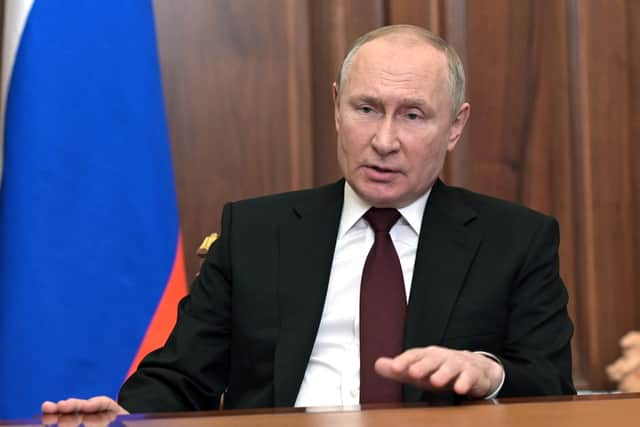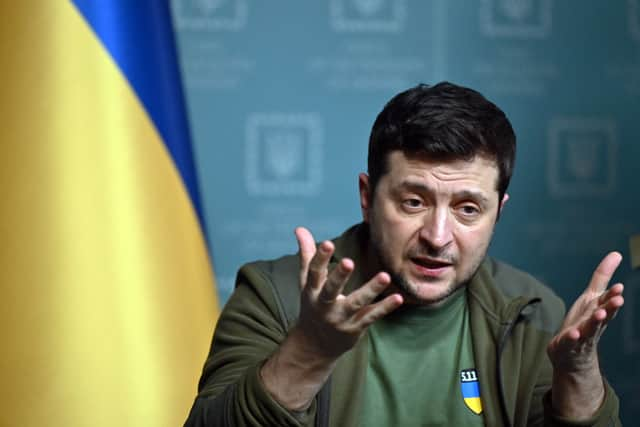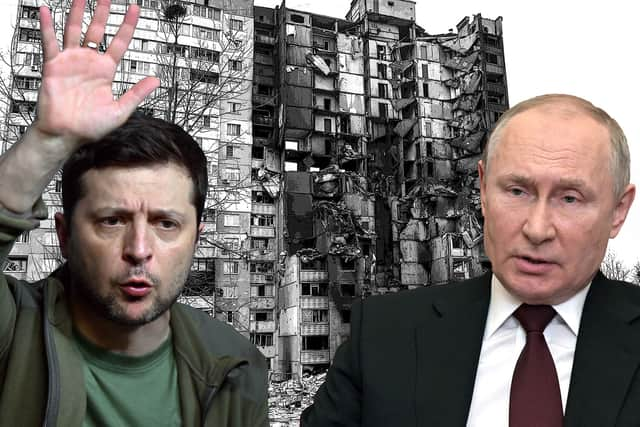How could the war in Ukraine play out? How long it could last, impact of sanctions and NATO response explained
This article contains affiliate links. We may earn a small commission on items purchased through this article, but that does not affect our editorial judgement.
and live on Freeview channel 276
While any military invasion of a sovereign European nation is shocking, the move was not a surprise, after Russian President Vladimir Putin spent months positioning troops and equipment on the Ukrainian border.
Advertisement
Hide AdAdvertisement
Hide AdSince that day, the world has seen to what lengths Russia will go to in its use of force, including an attack on a Mariupol hospital which left three people - including one child - dead.
After almost three weeks of brutal warfare, which has seen thousands of civilians and military personnel killed, the question is what Putin will do next, and how long this war could ultimately last, given the strength of the Ukrainian resistance.
We spoke to James Rogers, co-founder and director of strategy at the Council on Geostrategy, about what to expect from the war in Ukraine.


How long could the war in Ukraine last?
Russian troops moved into eastern Ukraine almost three weeks ago, and while they are now encircling the capital of Kyiv, their progress in Ukraine has been slower than expected.
Advertisement
Hide AdAdvertisement
Hide AdExperts have theorised that the main conflict could last between four and six weeks, while the wider war could continue for further decade or more.
But the origins began well before the invasion on 24 February.
“Let's not forget that the conflict in many ways has now gone for eight years,” Rogers says.
“It started in 2014 when Russian so-called ‘little green men’ sprung over the border into Ukraine and into the Donbas region. They annexed Crimea, which was a large chunk of Ukraine, and then stirred up and created conflict in this region. This is a continuation of an existing conflict, not a conflict which is new.”
Advertisement
Hide AdAdvertisement
Hide AdWhile a specific timeframe is impossible to estimate at this time, Rogers warns that Western involvement could turn the existing war into a “proxy conflict”.
“The most important thing is the desire and needs of the Ukrainian people represented by the Ukrainian government of Mr Zelensky,” he says.
“It really is up to them decide how long they wish to fight and what the fighting is worth - for their nationhood, their continuation as an independent country - therefore, it is not really possible to put a timeframe other than say it is already gone on for a very long time and it is not over by any means yet.”


Even if a ceasefire or agreement is reached between Russia and Ukraine in the not too distant future, there is also a warning that this may not quell Russian aggression years down the line, according to Rogers.
Advertisement
Hide AdAdvertisement
Hide Ad“There's nothing to say that in another one or two years from now, assuming that ceasefire or settlement is reached this year, that the Russians won’t start pushing again and we'll see another round of invasion and occupation and war again on European soil.”
Will foreign forces directly intervene in the Ukraine conflict?
Western nations have swiftly imposed sanctions on Russia as a result of its aggression towards Ukraine, but there is still the question of whether NATO or non-NATO troops will eventually intervene in the conflict.
But this is extremely unlikely, certainly from countries who are members of NATO, with the West already rejecting President Zelensky’s plea for a no-fly zone over Ukraine out of fear that this would be seen as escalation by Russia.
And the West’s fear lies in the ruin that Russia could cause if a NATO state is seen to be intervening.
Advertisement
Hide AdAdvertisement
Hide Ad“There will be calls for us to do more than we are already doing. The problem, however, is that Russia has power and it has the ability to render most Western countries to nothing more than radioactive ruins,” Rogers says.
“Of course, we have the capacity through the British and American nuclear deterrent to do the same to Russia. But nonetheless, there is a risk.
“The moment that you apply, in particularly, a no-fly zone, you have to negate or destroy the Russian air defence systems in and around Ukraine, which could be a risk to British or American aircraft, and that will require a concerted bombing campaign to get rid of them.
“I think it would be something that leaders, particularly the British prime minister and the American president, will be very, very reluctant to do because they understand the potential consequences of it. So therefore, I think, frankly, that it's very unlikely. It is far more likely that we will provide Ukraine with indirect assistance.”


Have sanctions had an influence on Putin’s campaign in Ukraine?
Advertisement
Hide AdAdvertisement
Hide AdSo the principal tactic used by Western states to try to counteract Russian aggression is economic sanctions.
They were swiftly brought in and have already had a huge impact on the Russian economy.
The Kremlin said on 10 March that the economy was in a state of “shock”, with spokesman Dmitry Peskov explaining: “This is absolutely unprecedented. The economic war that has started against our country has never taken place before. So it is very hard to forecast anything.”
The ruble has also crashed, inflation is soaring and banks are unable to control the rising rates due to not being able to access additional funds.
Advertisement
Hide AdAdvertisement
Hide AdRussia’s top business leaders and oligarchs might be feeling the squeeze, but Rogers believes that the sanctions won’t stop Putin in his Ukrainian campaign.
“Mr Putin understands the nature of his country. He's built this regime he rules over for the past 20 years.
“He's put in place systems of personal patronage to ensure that the economic elites, the so-called oligarchs within his kleptocratic form of government, are kept quiet and that the security apparatus over which he lords reigns supreme.
“We've already heard him make noises about imposing martial law, or dissenters immediately crushed by the riot police. And the information space in Russia is vigorously controlled, increasingly so in this conflict.”
Advertisement
Hide AdAdvertisement
Hide AdThe sanctions imposed by the West are long-term weapons to “grind down the Russian economy and make it harder for the Kremlin to wage war”, rather than have an immediate impact.
However, there is one way in which sanctions could have an immediate impact on Putin’s decision making.
“Mr Putin might consider that the sanctions being applied or indirect military assistance that has been given to Ukraine could constitute an act of war,” Rogers says.
“He could begin to use even more destructive weapons, particularly nuclear or tactical nuclear weapons either in Ukraine or against a NATO ally, perhaps one which has been ferrying military equipment to Ukraine.”
Can the West do anything else to stop Russia?
Advertisement
Hide AdAdvertisement
Hide AdIf the West is unwilling to directly intervene aside from sanctions, what else can be done to stop Russia’s violent attack on Ukraine?
Rogers has described “potentially creative responses” which the US and NATO allies could turn to to push back against Russian aggression.
“It gets into the weird and wonderful,” he says.
“Parts of Ukraine could potentially - with the Ukrainian government’s consent - be absorbed into surrounding countries and therefore NATO security guarantee would then sit over them.
“It is potentially possible that some kind of peacekeeping forces could be deployed to different countries to the western parts of Ukraine, particularly if there is a humanitarian emergency.”
Advertisement
Hide AdAdvertisement
Hide AdHowever, these out-of-the-box moves may be unlikely to be taken due to the expected risk of a nuclear exchange.
“The fact that Russia is well armed with nuclear weapons and has the ability to fire them almost anywhere on the planet will act as a massive disincentive for doing that or running that risk, particularly when the economic sanctions being imposed are so robust and are already making themselves felt.”
Support people fleeing the devastating conflict in Ukraine: donate to the DEC appeal
Disasters Emergency Committee (DEC) charities and their local partners are in Ukraine and in neighbouring countries providing food, water, shelter and medical assistance. Learn more and donate what you can today
A message from the editor:
Thank you for reading. NationalWorld is a new national news brand, produced by a team of journalists, editors, video producers and designers who live and work across the UK. Find out more about who’s who in the team, and our editorial values. We want to start a community among our readers, so please follow us on Facebook, Twitter and Instagram, and keep the conversation going. You can also sign up to our email newsletters and get a curated selection of our best reads to your inbox every day.
Comment Guidelines
National World encourages reader discussion on our stories. User feedback, insights and back-and-forth exchanges add a rich layer of context to reporting. Please review our Community Guidelines before commenting.
